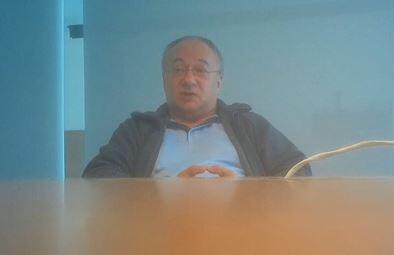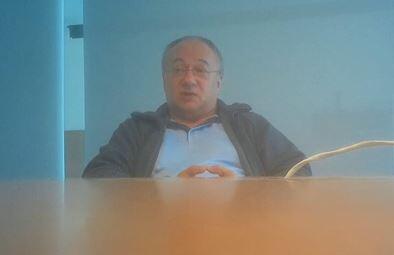
Startup CEO's assets frozen after allegedly forging contracts with tech giants
The founder of Promai, and the mistress of the former CEO, claims he created fake partnerships with major corporations.
The Tel Aviv District Court has imposed a temporary asset seizure of up to 10 million shekels on Erez Ben Eshay, the former CEO of the startup Promai, following a lawsuit filed by Dr. Dina Olga Goren-Bar—his former partner, both personally and professionally, and the company’s largest shareholder (78%).
The lawsuit accuses Ben Eshay of fraud that allegedly emptied the company’s coffers. As part of an internal investigation led by the Wizman-Yaar investigation firm, the court ordered seizures on multiple assets, including: a house located on half a dunam in Moshav Sitria (jointly owned with his wife); two plots of land in Rehovot, one of which is zoned for construction and entitles the couple to 3.12 housing units; a yacht worth approximately €80,000 docked in Ashkelon; a 2023 Audi A3 with an outstanding loan of 180,000 shekels; a 2020 Suzuki Ignis; an active Bank Hapoalim account; and a More provident and pension fund.
In the lawsuit, Dr. Goren, represented by attorneys David Forer and Limor Levy, claims that Ben Eshay misrepresented himself as a test pilot and retired brigadier general in the Israeli Air Force. “The defendant fraudulently gained Dr. Goren’s trust, leading to both a personal and business relationship,” the filing states. “It has since come to light that the defendant is married and lives with another woman. His explanations for being away at night, allegedly due to operational or military commitments, were fictitious.”
Based on these alleged misrepresentations, Dr. Goren claims she transferred 12% of the company’s shares to Ben Eshay and appointed him CEO.
Ben Eshay denies all allegations but is being sued for damages of 10 million shekels.
The suit further claims that Ben Eshay's actions resulted in nearly 20 million shekels—essentially all of Promai’s capital— being directed toward developing products supposedly for companies such as Boeing, Tesla, and Medtronic, none of which had actually placed orders. According to the lawsuit, these projects were based on forged contracts.
In transcripts submitted to the court, Ben Eshay is quoted admitting: “I served in the Air Force for five years at the Flight Test Center. I was involved in development, but I’m not a pilot,” Ben Eshay, who holds both Romanian and Israeli citizenship, told investigators, according to transcripts. He described a series of roles he held after leaving the IDF, including at a company he said was sold, earning him $1 million, and a position as CTO of Rit Technologies, which he said he left in 2011 “due to a dispute with the CEO.” From 2013 to 2022, he said, he worked in the sailing industry and opened a school in Cyprus called “Ocean Yachting” that later closed. He claims to own a yacht docked in Ashkelon, registered under an English company (“46 feet, about 14 meters, I estimate it’s worth 80,000 euros”). A shared love of sailing, he testified, was what initially connected him and Dr. Goren.
“In 2022 I met Dina,” he was quoted as saying. “We sailed a lot and grew close. She shared some of her ideas, and that’s where it all began. She founded the company—77–78% to Dina, 12% to me, and about 10% to Howard Miller.”
“It started in February 2024,” testified the former CEO of the company, which operates out of Tel Aviv and employs about 40 people. “That’s when I started inventing contracts with customers who had supposedly signed deals to purchase the product or had shown interest.”
He added: “I fabricated all the agreements in advance. There was no correspondence with the officials from these companies, no deal summaries, no actual expressions of interest in the product. I want to state that I forged the documents to create a false impression for potential investors and shareholders.”
Investigators showed Ben Eshay a document found on his computer with Boeing’s logo, signed by the company’s CEO David Calhoun and dated May 23, 2024. “I invented this document,” he said. “Calhoun’s signature was taken from the internet.”
Investigator: Did you ever speak or correspond with him?
Ben Eshay: “No.”
Investigator: Who drafted the agreement?
Ben Eshay: “I did. I asked ChatGPT to draft a letter on behalf of Boeing, supposedly attaching a contract and compliments about the company’s activities. I asked the chat to create a Boeing stamp with the CEO and legal advisor’s signatures.”
Investigator: Did you speak to anyone from Boeing?
Ben Eshay: “I contacted a few Boeing executives via LinkedIn, and apart from a laconic reply directing me to the company website, I had no interaction.”
Attorneys Ariel Shmul and Avital Kidron, who represent Ben Eshay, responded:
“Our client denies all allegations against him. These claims are entirely baseless and completely fabricated. Our client acted lawfully and ethically in his capacity as CEO. He has suffered significant personal and financial harm due to the conduct of certain individuals within the company. The use of his name in this affair is a mistake, and he is not responsible for the situation. At most, this appears to be a commercial dispute among other parties — not one involving our client.”
Attorneys David Forer and Limor Levy, who represent Promai, said: “As detailed in the lawsuit, the Wizman-Yaar Investigations Company documented the defendant confessing both in writing and verbally. In light of this, the denial by his lawyers is puzzling. The defendant should assist the company in repairing the severe damage he caused.”














